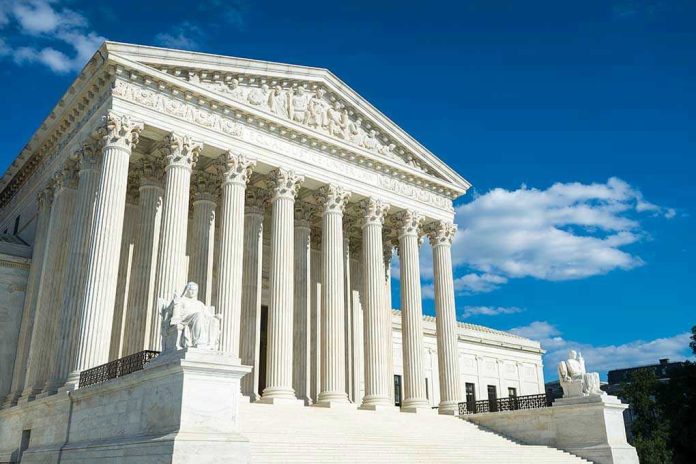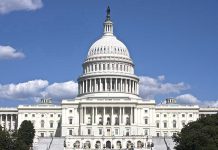
The Supreme Court’s emergency greenlight for ICE “roving” raids in California delivers a decisive Trump-era victory for border security, igniting fierce debate over constitutional rights and federal power.
Story Highlights
- The Supreme Court, in a 6-3 split, allowed the Trump administration’s ICE to resume “roving” immigration raids in Los Angeles and surrounding counties.
- Lower courts had blocked the raids over concerns about racial profiling and potential Fourth Amendment violations.
- The decision underscores a renewed federal push for aggressive immigration enforcement, clashing with California’s sanctuary policies.
- This emergency ruling, issued without a full hearing, has immediate and sweeping impact on immigration enforcement and constitutional debate.
Supreme Court Lifts Ban on ICE Raids, Reigniting Federal and State Tensions
U.S. Supreme Court issued a 6-3 emergency order permitting the Trump administration to resume “roving” ICE raids in California. This decision reversed a previous injunction by a federal district court that had halted these raids due to concerns about potential violations of Fourth Amendment rights. The high court’s intervention marks a significant moment in the ongoing battle over federal immigration authority, particularly in a state that has long resisted such enforcement actions. The ruling is temporary but enables ICE agents to conduct broad sweeps while appeals continue.
Federal immigration enforcement has historically included “roving patrols,” but their recent expansion into urban California—targeting locations from car washes to parks—has heightened controversy. The Trump administration’s approach relies on broad criteria, including language, appearance, and employment type, to identify individuals for detention. Civil rights groups and local officials have challenged these tactics, alleging widespread racial profiling and constitutional overreach. Despite these objections, the Supreme Court’s emergency stay has provided federal authorities with latitude to proceed, pending further legal review in the Ninth Circuit.
Legal Battle Over Constitutional Rights and Federal Power
The case pits the Trump administration’s argument for robust federal authority against claims by plaintiffs and advocacy groups that the raids violate core constitutional protections. The plaintiffs contend that detaining individuals based on race or language erodes civil liberties and undermines the Fourth Amendment. The federal government maintains that “reasonable suspicion” justifies the stops, echoing precedents but applying them in a much broader, modern context. With California’s large immigrant population and sanctuary policies, the dispute highlights the ongoing tension between state and federal priorities regarding immigration enforcement.
Justice Sotomayor’s dissent describes the Supreme Court’s use of its emergency docket as a “grave misuse,” warning of the dangers to constitutional rights. In contrast, Justice Kavanaugh’s concurrence emphasizes long-standing legal standards that favor federal enforcement powers. The ruling immediately affects immigrant communities in Southern California, creating uncertainty and intensifying debates over civil rights, law enforcement, and the limits of executive authority. The case now returns to the Ninth Circuit, but the impact of resumed raids is already rippling through affected industries and communities.
Broader Impact on Communities, Industries, and National Debate
In the short term, ICE’s renewed authority is generating fear and distrust among immigrant communities, particularly Latino and low-wage worker populations. Local law enforcement and governments face increased pressure as they navigate federal mandates and local resistance. Economically, service, agriculture, and low-wage sectors may experience workforce disruptions, while legal and advocacy organizations mobilize for continued litigation. Politically, the decision amplifies national debates over the balance between law enforcement, individual rights, and the proper scope of federal power.
JUST IN: Supreme Court Hands Trump Two Big Wins Via Emergency Rulinghttps://t.co/JqaDzWv0Y4
— Mediaite (@Mediaite) September 8, 2025
Experts warn that the Supreme Court’s emergency intervention could set a precedent for broader federal authority in immigration enforcement, potentially at the expense of constitutional safeguards. Legal scholars highlight the risk of normalizing racial profiling, while supporters of the raids argue that robust enforcement is essential for national security and upholding the rule of law. The ruling’s temporary nature means the legal battle is far from over, but its immediate effects are already reshaping the relationship between federal and local governments—and fueling passionate debate about the future of American immigration policy.
Sources:
Supreme Court allows Trump administration’s ICE “roving” immigration raids to resume in California
Supreme Court immigration stops Los Angeles
Supreme Court official opinion and dissent
LA immigration sweeps Supreme Court
Supreme Court resumes roving immigration raids in California, yielding to Trump












